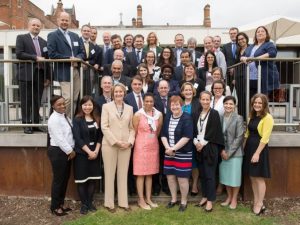Dr Zahra Siddique (SPEIR) received the runner-up prize in the P&R Output Prize for her co-authored article ‘The Economic Payoff of Name Americanization’. The article explores why more than 30% of migrants who settled in New York City in the 1920s changed their names, and what economic benefits those name-changes brought about.
Author: martinwatts
News from Prosperity & Resilience: Participation Lab
The Participation Lab, led by SAGES researchers, continues to support participatory research within and outside of the University. Its 2nd Annual Workshop on ‘Participation for the 2030 Agenda for Sustainable Development’ took place on 30 June 2017.
News from Prosperity & Resilience: Alex Arnall
Dr Alex Arnall has recently been awarded funding by the ESRC-DFID Development Frontiers scheme for an 18 month research project entitled ‘Negotiating conflict: Environmental violence, economic development and the everyday practices of islanders’.
News from Prosperity & Resilience: Peter Dorward
In May 2017 the Guyana government together with the Caribbean Institute of Meteorology and Hydrology facilitated a workshop one developing Participatory Integrated Climate Services of Agriculture (PICSA). The training enabled farmers to make informed decisions based on accurate, location specific, climate and weather information; locally relevant crop, livestock and livelihood options, and with the use of participatory tools, aid their decision making.
News from Prosperity & Resilience: Sally-Lloyd Evans
In June 2017 Sally-Lloyd Evans (SAGES) received the INVOLVE award at the Research Impact and Engagement Champions awards ceremony.
News from Prosperity and Resilience: Walker Institute and Marie Aronsson-Storier
The School of Law and the Walker Institute, together with the American Society of International Law, held the Disaster Risk Reduction and International Law Symposium at UoR between 29 June and 1 July 2017. The highly engaging Symposium brought together academic, government, industry, IGO, and NGO participants from all over the world to explore this rapidly growing area of law, policy and practice.
News from Prosperity and Resilience: Dr Hilary Geoghegan
New initiative set to transform public’s engagement with environmental research
Dr Hilary Geoghegan was recently awarded £100,000, from the NERC Engaging Environments programme, to develop a national vision for public engagement with environmental research. The new initiative, called OPENER, will ask members of the public to help them in opening up research on the major environmental challenges facing the planet. OPENER will identify ways that researchers can involve people at all stages of the research process.
News from Prosperity and Resilience: Sam Rawlings
Dr Sam Rawlings (SPEIR) has been investigating the impact of parental education on child health, exploiting a compulsory schooling law reform implemented in China in 1986 to identify effects. The key findings are that maternal education affects child health, but only for boys. Maternal education has sizable and significant effects on boys height-for-age (a measure of long-run health status), but effects are smaller and not statistically significant for girls. This is an important finding in China, where son preference exists and reflects the traditional patriarchal Confucian system in which girls and women are marginalised in society.
News from Prosperity and Resilience: Dr Eleanor Fisher
Dr Eleanor Fisher (SAPD) published ‘The livelihood impacts of cash transfers in sub-Saharan Africa: beneficiary perspectives from six countries’ (2017) World Development 99, pp. 299-319 (with Attah, R., Barca, V., O’Brien, C., Brook, S., Holland, J., Kardan, A. and Pozarny, P.).
News from Prosperity and Resilience: Andrew Ainslie
Current research in the Lake Victoria Basin
by Dr Andrew Ainslie, Lecturer in International Rural Development
I am part of a team led by the Walker Institute conducting research in the Lake Victoria Basin, as part of the Future Climate for Africa programme. I recently returned from two and a half weeks in Uganda, where I studied the governance of land in the districts bordering Lake Victoria. Some uncertainty surrounds just what impacts shifts in the climate will have in this region, but what is far more certain is that millions more people are destined to migrate into the Basin over the coming decades, augmenting the natural increase in population, and placing the natural and social resources in the region under increasing strain.








